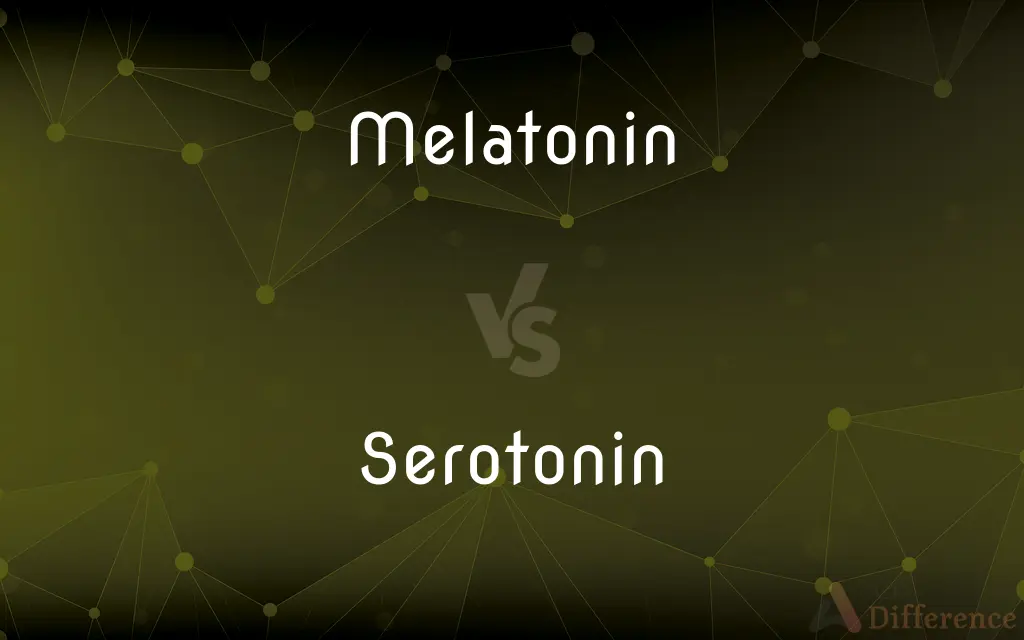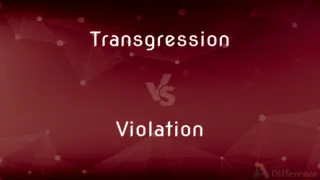Melatonin vs. Serotonin — What's the Difference?
By Fiza Rafique & Urooj Arif — Updated on May 16, 2024
Melatonin is a hormone regulating sleep-wake cycles, while serotonin is a neurotransmitter involved in mood, appetite, and sleep regulation.

Difference Between Melatonin and Serotonin
Table of Contents
ADVERTISEMENT
Key Differences
Melatonin is a hormone primarily produced by the pineal gland in the brain. Its primary function is to regulate sleep-wake cycles by responding to darkness, signaling the body that it's time to sleep. Melatonin levels rise in the evening and peak during the night, helping to promote sleep. Serotonin, on the other hand, is a neurotransmitter that plays a critical role in various bodily functions, including mood regulation, appetite, and digestion. It is primarily found in the gastrointestinal tract, blood platelets, and the central nervous system.
While melatonin directly affects sleep by regulating circadian rhythms, serotonin contributes indirectly to sleep regulation by being a precursor to melatonin. This means that serotonin is converted into melatonin in the pineal gland. Additionally, serotonin's impact on mood and emotional state can influence sleep quality and patterns.
Melatonin is often used as a supplement to help with sleep disorders such as insomnia or jet lag. It helps to adjust the body's internal clock to promote better sleep onset and quality. Serotonin, however, is targeted by certain medications, like selective serotonin reuptake inhibitors (SSRIs), to treat depression and anxiety by increasing serotonin levels in the brain.
Both melatonin and serotonin play essential roles in the body's overall health and well-being, but they operate through different mechanisms and have distinct primary functions.
Melatonin's production is influenced by the light-dark cycle, whereas serotonin is influenced by diet, exercise, and exposure to natural light. Both are vital for maintaining balanced physiological functions.
ADVERTISEMENT
Comparison Chart
Type
Hormone
Neurotransmitter
Primary Function
Regulates sleep-wake cycles
Regulates mood, appetite, and digestion
Production Site
Pineal gland
Gastrointestinal tract, CNS, blood platelets
Role in Sleep
Directly regulates sleep by signaling darkness
Precursor to melatonin, affects sleep quality
Supplement Use
Used for sleep disorders
Used in medications for depression and anxiety
Influencing Factors
Light-dark cycle
Diet, exercise, natural light exposure
Compare with Definitions
Melatonin
Helps signal the body that it's time to sleep.
As melatonin levels rose, she began to feel sleepy.
Serotonin
A neurotransmitter regulating mood, appetite, and digestion.
High levels of serotonin improve mood and overall well-being.
Melatonin
A hormone regulating the sleep-wake cycle.
Taking melatonin supplements helped John adjust to his new time zone.
Serotonin
Known as the "feel-good" neurotransmitter.
Serotonin helps alleviate symptoms of depression.
Melatonin
Commonly used to treat sleep disorders.
Melatonin is recommended for people with insomnia.
Serotonin
Targeted by antidepressant medications.
SSRIs increase serotonin levels to treat depression.
Melatonin
Produced by the pineal gland in response to darkness.
The body increases melatonin production in the evening.
Serotonin
Precursor to melatonin in the pineal gland.
Serotonin is converted to melatonin at night.
Melatonin
Influenced by light exposure.
Bright lights at night can suppress melatonin production.
Serotonin
Found in the gastrointestinal tract, CNS, and blood platelets.
Most serotonin is located in the gut, influencing digestion.
Melatonin
Melatonin is a hormone primarily released by the pineal gland at night, and has long been associated with control of the sleep–wake cycle. As a dietary supplement, it is often used for the short-term treatment of insomnia, such as from jet lag or shift work, and is typically taken orally.
Serotonin
Serotonin () or 5-hydroxytryptamine (5-HT) is a monoamine neurotransmitter. Its biological function is complex and multifaceted, modulating mood, cognition, reward, learning, memory, and numerous physiological processes such as vomiting and vasoconstriction.Biochemically, the indoleamine molecule derives from the amino acid tryptophan, via the (rate-limiting) hydroxylation of the 5 position on the ring (forming the intermediate 5-hydroxytryptophan), and then decarboxylation to produce serotonin.
Melatonin
A hormone secreted by the pineal gland which inhibits melanin formation and is thought to be concerned with regulating the reproductive cycle.
Serotonin
An organic compound, C10H12N2O, that is formed from tryptophan and is found especially in the gastrointestinal tract, the platelets, and the nervous system of humans and other animals, and functions as a neurotransmitter and in vasoconstriction, stimulation of the smooth muscles, and regulation of cyclic body processes.
Melatonin
An animal hormone, C13H16N2O2, derived from serotonin and produced by the pineal gland. It stimulates color change in the skin of amphibians and reptiles and plays a role in regulating circadian rhythms and reproductive cycles in mammals. It is also found in plants and fungi.
Serotonin
(neurotransmitter) An indoleamine neurotransmitter, 5-hydroxytryptamine, that is involved in depression, appetite, etc., and is crucial in maintaining a sense of well-being, security, etc.
Melatonin
A hormone, related to serotonin, that is secreted by the pineal gland, and stimulates colour change in the skin of reptiles, and is involved in the sleep/wake and reproductive cycles in mammals.
Serotonin
A neurotransmitter involved in e.g. sleep and depression and memory
Melatonin
Any material similar in its chemistry and effect to the natural hormone.
Melatonin
A hormone secreted by the pineal gland. Chemically it is N-acety-5-methoxytryptamine. Research has indicated that there are daily rhythms in secretion of melatonin, in particular due to the depressing effect on melatonin production by light received by the retina. Conversely it appears that melatonin may influence the circadian rhythms of animals. There is some experimental evidence that administration of melatonin may increase the amount of sleep in people with sleep disorders. However, the evidence is not convincing and the effect is not profound. Nevertheless, the deregulation of melatonin and its availability over-the-counter has led to many people taking melatonin to help sleep, without consulting a physician.
A role for melatonin in sleep facilitation has been inferred from its effect on electroencephalogram patterns, but it has not been possible to demonstrate that wakefulness sleep cycles are driven by periodic accumulation, depletion, or regeneration of melatonin.
Melatonin
Hormone secreted by the pineal gland
Common Curiosities
How does melatonin affect sleep?
Melatonin signals the body that it's time to sleep by responding to darkness.
Can melatonin supplements help with insomnia?
Yes, melatonin supplements are commonly used to treat insomnia and other sleep disorders.
What is serotonin?
Serotonin is a neurotransmitter involved in mood, appetite, and digestion.
How does serotonin influence mood?
Serotonin helps regulate mood, making you feel happier and more balanced.
Where is serotonin found in the body?
Serotonin is found in the gastrointestinal tract, central nervous system, and blood platelets.
What factors influence serotonin levels?
Serotonin levels are influenced by diet, exercise, and exposure to natural light.
What is melatonin?
Melatonin is a hormone that regulates the sleep-wake cycle.
Where is melatonin produced?
Melatonin is produced in the pineal gland of the brain.
How is serotonin related to melatonin?
Serotonin is a precursor to melatonin, meaning it is converted into melatonin in the pineal gland.
What factors influence melatonin production?
Melatonin production is influenced by the light-dark cycle.
Are melatonin supplements safe?
Melatonin supplements are generally considered safe for short-term use.
Can melatonin help with jet lag?
Yes, melatonin can help reset the body's internal clock and alleviate jet lag.
Does serotonin affect digestion?
Yes, serotonin plays a significant role in regulating digestion and gut function.
Can serotonin impact sleep quality?
Yes, serotonin can impact sleep quality indirectly by being a precursor to melatonin.
What are SSRIs?
SSRIs (selective serotonin reuptake inhibitors) are medications that increase serotonin levels to treat depression and anxiety.
Share Your Discovery

Previous Comparison
Pigeon vs. Squab
Next Comparison
Transgression vs. ViolationAuthor Spotlight
Written by
Fiza RafiqueFiza Rafique is a skilled content writer at AskDifference.com, where she meticulously refines and enhances written pieces. Drawing from her vast editorial expertise, Fiza ensures clarity, accuracy, and precision in every article. Passionate about language, she continually seeks to elevate the quality of content for readers worldwide.
Co-written by
Urooj ArifUrooj is a skilled content writer at Ask Difference, known for her exceptional ability to simplify complex topics into engaging and informative content. With a passion for research and a flair for clear, concise writing, she consistently delivers articles that resonate with our diverse audience.













































